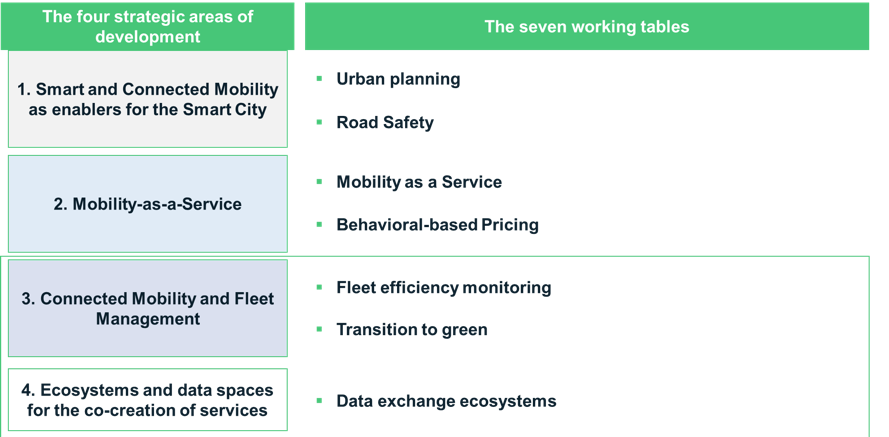This article describes the key messages that emerged during the last round tables organised by OCTO and The European House – Ambrosetti with leading companies and institutions in Italy in the implementation of connected mobility projects. In particular, the working tables analysed in this article focused on a topic of extraordinary importance about the innovation of mobility service business models, namely “Data Spaces for the Co-Creation of Services”.
OCTO and The European House – Ambrosetti organised, for the second consecutive year, an intense stakeholder engagement activity – involving more than 40 actors – with the aim of understanding the real needs of mobility actors and promoting a synergic development of a new paradigm of connected, sustainable and smart mobility.

Figure 1 The four strategic development areas and the seven working tables
Data exchange ecosystems
The last round table was devoted to data exchange ecosystems – an area of horizontal relevance to all other topics covered in the stakeholder engagement track.
First, it is good to define what a data space is by specifying what it ‘is not’. A data space is not a data pool, i.e. a space – or infrastructure – in which data is accumulated. A data space is not a way of data sharing. Finally, a data space does not identify an IT technology or architecture.
A data space is a new concept that allows information – not data – to be shared within a secure federation of stakeholders, while retaining ownership of the data and not migrating it. In this sense, the federation is based on a set of pre-defined rules with respect not only to sharing formats, but also with respect to who can use the shared information and for what purposes.
The concept makes it possible to avoid models of free exchange of heterogeneous data that are often difficult to use and, on the other hand, makes it possible to define models in which the exchange of value between the parties within a certified environment that creates trust and added value for the stakeholders involved is clear.
In this way, it is possible to break down the silos that currently prevent the creation of value through data (silos related to intellectual property, lack of trust, technical difficulty of integration, and lack of a business model), thus enabling the co-creation of new services and innovation. One thinks, for instance, of the importance that information sharing will have in enabling increasing levels of automation in mobility, infrastructure, and service delivery where choices will derive from approaches based on the dynamic analysis of data from different sources.
Below are the key messages from the Data Ecosystems Roundtable where companies, institutions and academics came together to discuss this important topic:
- More and more companies and public administrations require multidisciplinary and data-driven approaches. Within Smart Cities, different data sources can be aggregated to form digital twins in which the combined reading of data enables innovative strategies for city management and service delivery;
- The increasing availability of data will enable the development of increasingly complex forecasting models, which in turn will allow more advanced and precise planning of the dynamics within cities;
- In the future, it will be crucial to promote greater sharing of applications and experiences between public administrations in order to maximise opportunities for value creation;
- By leveraging data, it is possible to envisage a more active role for citizens through rewarding mechanisms that enhance virtuous behaviour.
The next article in this series will be dedicated to the analysis of regulation at EU level. Indeed, it is considered an enabling factor for the spread of the connected mobility paradigm and ecosystems.
Author:
The European House – Ambrosetti